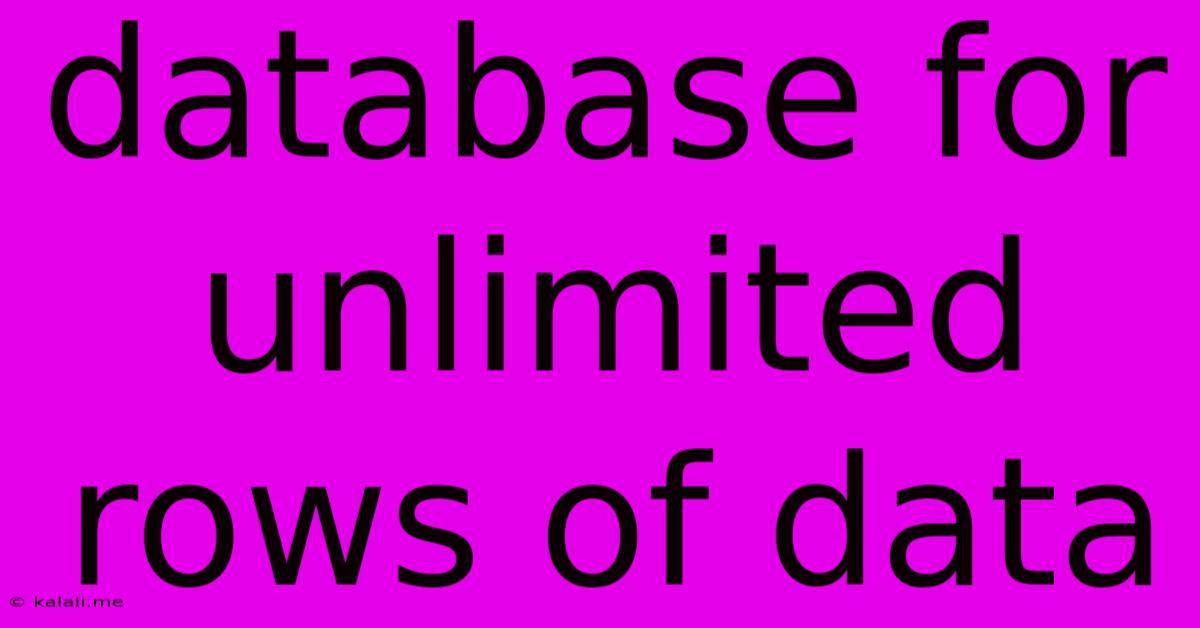Database For Unlimited Rows Of Data
Kalali
May 31, 2025 · 3 min read

Table of Contents
Databases for Unlimited Rows of Data: Scaling Your Data Storage
Are you dealing with a dataset that's constantly growing? Finding a database solution that can handle an unlimited number of rows is crucial for many applications, from large-scale analytics to ever-expanding transactional systems. The truth is, no database truly offers infinite storage, but many offer highly scalable solutions that effectively handle massive datasets without performance degradation. This article will explore several options and considerations for choosing the right database for your ever-growing data needs.
This guide will cover several database types suitable for handling massive datasets, focusing on their scalability and performance characteristics. We'll discuss the practical limitations and considerations you should keep in mind when choosing a solution.
Understanding Scalability in Databases
Before diving into specific database types, let's clarify what we mean by "unlimited" rows. No database can physically store an infinite amount of data, as this is limited by hardware constraints. However, certain database architectures are designed for horizontal scalability, meaning you can easily add more storage capacity (more servers) as your data grows. This contrasts with vertical scaling, where you upgrade the capacity of a single server. Horizontal scaling is crucial for handling truly massive datasets.
Database Options for Massive Data
Several database types are well-suited for handling datasets with seemingly unlimited rows. Each has its strengths and weaknesses:
1. NoSQL Databases (Document, Key-Value, Column-Family):
- Strengths: NoSQL databases are known for their horizontal scalability and flexibility in handling unstructured or semi-structured data. They excel at handling massive datasets with high write throughput. Examples include MongoDB (document), Cassandra (column-family), and Redis (key-value).
- Weaknesses: Data consistency can be more challenging to manage than in relational databases. Complex queries can be less efficient.
2. Relational Databases (with Sharding):
- Strengths: Relational databases (like PostgreSQL, MySQL) provide data integrity and ACID properties (Atomicity, Consistency, Isolation, Durability). They offer powerful querying capabilities using SQL. Using sharding, these databases can be horizontally scaled across multiple servers, distributing the data load.
- Weaknesses: Implementing sharding correctly can be complex and requires careful planning. It adds complexity to query optimization and data management.
3. Cloud-Based Data Warehouses:
- Strengths: Cloud providers like AWS, Google Cloud, and Azure offer managed data warehouse services (e.g., Amazon Redshift, Google BigQuery, Azure Synapse Analytics) that are designed for massive datasets and complex analytical queries. They handle scalability automatically, freeing you from infrastructure management.
- Weaknesses: Can be more expensive than self-managed solutions, especially for very large datasets. Vendor lock-in is a potential concern.
4. Distributed File Systems (HDFS, Ceph):
- Strengths: These systems are designed for storing and processing extremely large datasets across a cluster of machines. They're often used in conjunction with big data processing frameworks like Hadoop and Spark.
- Weaknesses: They are not typically used as primary databases for transactional applications. Data querying can be less efficient than in dedicated database systems.
Choosing the Right Database: Key Considerations
Selecting the ideal database depends on several factors:
- Data volume and growth rate: How much data do you currently have, and how quickly is it expected to grow?
- Data structure: Is your data structured (relational), semi-structured (JSON, XML), or unstructured (text, images)?
- Query patterns: What types of queries will you be running? Will you be performing primarily analytical queries or transactional operations?
- Budget: Consider the cost of infrastructure, licensing, and management.
- Scalability requirements: How easily do you need to be able to scale your database to accommodate future growth?
Choosing the right database is a crucial step in managing massive datasets. Careful consideration of these factors will guide you towards a solution that effectively handles your current and future data needs. Remember that the best approach may involve a combination of technologies to leverage the advantages of different systems.
Latest Posts
Latest Posts
-
How Do I Change A Recessed Light Bulb
Jun 01, 2025
-
How To Find An Angle With Two Sides
Jun 01, 2025
-
What Size Circuit Breaker For Dryer
Jun 01, 2025
-
What Is A Magic Action Dnd
Jun 01, 2025
-
How Much Does A Water Heater Weigh
Jun 01, 2025
Related Post
Thank you for visiting our website which covers about Database For Unlimited Rows Of Data . We hope the information provided has been useful to you. Feel free to contact us if you have any questions or need further assistance. See you next time and don't miss to bookmark.